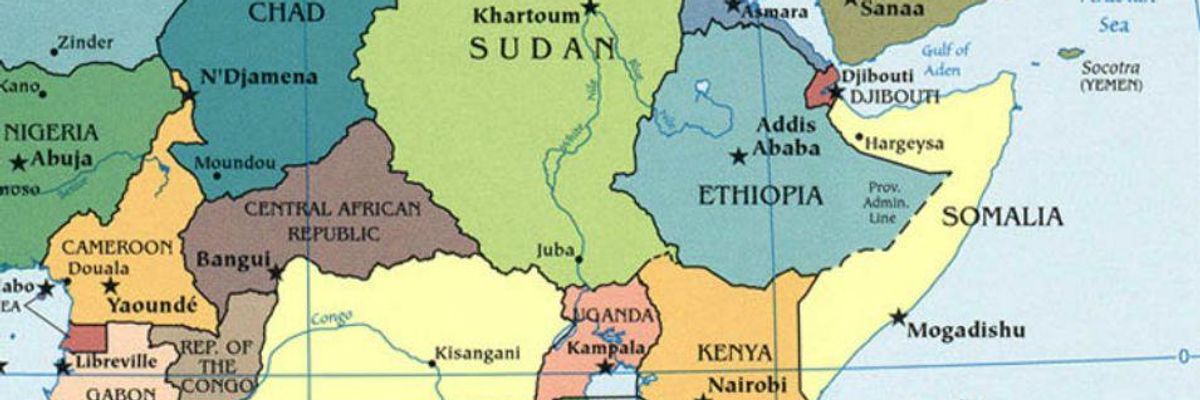President Obama's visit to Kenya is of course personal, though he has been there before both as a civilian and as a senator. But it does also have a geopolitical and economic dimension.
Kenya is a country of roughly 46 million people, about the same as Spain. But its nominal gross domestic product is only $70 billion a year (Spain's is 1.4 trillion). But its economy has been growing impressively, with 6% growth expected this year despite a downturn in coastal tourism because of terrorist incidents and a drought that has hurt agriculture.
It mainly produces agricultural products such as vegetables, fruits, tea and coffee, as well as some minerals. The US and Kenya only do a little over $1 billion in trade with one another annually, with the US selling a bit more than it imports. (It mainly sells machinery to Kenya, including everything from aircraft to medical equipment).
Kenya's strategic position derives in part from its abutting the Horn of Africa to the north, off the coast of which is one of the world's most important trade routes, linking the Indian Ocean to the Red Sea and thence the Mediterranean and Europe through the Suez Canal.
On land, Kenya is a player in Somalia, which has been wracked by decades of internal instability and is still under threat by the al-Shabab terrorist group, despite successful presidential elections and steps back toward normality. In 2012-2013 Kenya partnered with the Somali government in operations against al-Shabab. Al-Shabab has hit Kenya twice with big attacks as part of its struggle to come back to power in Somalia, a prospect Kenya's opposition makes unlikely. One of these left 147 dead at Garissa University College in early April of this year. The al-Shabab attacks led CNN unfairly to call Kenya a "hotbed of terrorism." (This is not true and it is perfectly safe to visit).
The entire region stretching north from Kenya is mixed Christian and Muslim (Kenya is 11 percent Muslim) and a site of religious tension. Of course, this is an arena of the US "war on terrorism," and al-Qaeda hit US embassies in East Africa in 1998.
Africa is also increasingly an arena of competition between the United States and China. China invested $5 billion in infrastructure projects in Kenya, and has twice the volume of trade with Africa as the United States does.
Kenya is moving to provide the other 80% of its population with electricity that does not now have it, and likely Chinese solar panels will be important to this endeavor. The opportunity costs of American business's antipathy to solar technology mean that China is able to get the bids to provide solar panels and even panel factories for local production. China is building a 50 megawatt solar plant in Kenya.
Kenya has a mixed record on elections and human rights. On the one hand, its parliamentary elections are generally thought aboveboard. Political violence in 2007 and suspicions of stirring it up for political gain have resulted in cases against the current president and vice president by the International Criminal Court, though the case against President Uhuru Kenyatta did not go forward.
Obama is the first president to visit Kenya and Ethiopia, attesting how neglected this part of the world has been in the United States. For the geopolitical reasons mentioned above, that neglect is unwise. Africa's population will quadruple in this century at a time when countries like Germany and Japan are thought likely to shrink in population; Africa will be the world.
